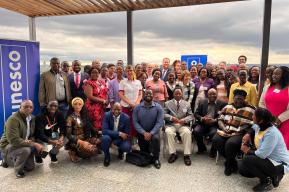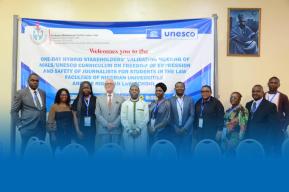News
Successful regional follow-up conference for CONFINTEA VII held in Asia

The UNESCO Institute for Lifelong Learning (UIL) and the UNESCO Multisectoral Regional Office in Bangkok jointly organized an online regional conference on 30 May 2023, as a follow-up to the Seventh International Conference on Adult Education (CONFINTEA VII), held in Marrakech in June 2022. CONFINTEA VII aimed to advance follow-up actions in priority areas outlined in the Marrakech Framework for Action (MFA) within the Asia-Pacific region. The collaborative effort was greatly supported by regional partners, including the UNESCO Multisectoral Regional Office and cluster offices in Beijing, Jakarta, New Delhi and Tehran, as well as the Asia South Pacific Association for Basic and Adult Education (ASPBAE).
Over 100 key stakeholders from Asia, comprising nominated government representatives from more than 20 countries, civil society organizations, and experts in adult learning and education (ALE), participated in the conference. The conference served as a platform for discussion, allowing participants to leverage their national experiences and perspectives to shape the tools and mechanisms required for establishing an inclusive lifelong learning system and promoting gender-responsive ALE.
Conference participants underscored the rapid advancements made in society and highlighted the critical need for educational transformation, particularly in response to the challenges posed by the pandemic, emerging technologies and the ever-changing job market. Governments, it was argued, must urgently initiate upskilling and reskilling programmes while prioritizing lifelong learning as a central objective, given the impact of technology and artificial intelligence on jobs.
A survey sent to participants prior to the conference found the most pressing challenges in the region to be equitable access to education for vulnerable groups, budgeting, law, policies and governance systems, the capacity of service providers, and ICT infrastructure/digital contents. Taking into consideration these challenges, the speakers presented best practice from their countries. In India for example, efforts were made to promote equity and inclusion by restructuring education systems, revising the national curriculum framework, encouraging adult education, and implementing outcome-based learning. Viet Nam established community learning centres and foreign language and informatics centres to support lifelong learning. Iran focused on skills development, with the government investing in enhancing skills and knowledge, both professional and practical. In addition, an ASPBAE representative emphasized the importance of defining a regional adult learning and education agenda, establishing regional and sub-regional monitoring mechanisms, and integrating the MFA with the SDGs framework.
Considerable attention was devoted to the conceptual framework, monitoring indicators, and data collection process for both the MFA and the Global Report on Adult Learning and Education (GRALE). Asian stakeholders engaged in productive exchanges of perspectives, strategies and best practice at the local, national and international levels to enhance ALE through the MFA in their respective countries. The COVID-19 pandemic, despite all its drawbacks, spurred a rapid digital transformation in education across Asia and globally by necessitating a move towards increased utilization of technology, the expansion of digital and accessible courses, and the greater adoption of hybrid learning. However, challenges such as limited funding and the absence of policies specifically addressing ALE were also acknowledged.
Numerous recommendations were put forth to foster effective collaboration among all societal actors in Asia, aligning with the objectives of the MFA. These recommendations included governments allocating public funding to ALE, with a specific focus on addressing the learning needs of people with limited access to education and experience societal disadvantages. Learner-centred programmes, community learning centres, and the promotion of inclusive and equitable education for all were highlighted. Notably, special attention was given to climate change education and sustainability, underscoring the importance of adopting a comprehensive approach that encompasses formal, non-formal, and informal education.
The regional follow-up conference successfully paved the way for continued progress in adult learning and education across Asia, enabling participants to exchange valuable insights and forge meaningful partnerships. It served as a catalyst for implementing the MFA and furthering lifelong learning opportunities throughout the region. In addition, the Conference established a Community of Practices that will allow the set-up of a multistakeholder cooperation, monitoring progress in adult learning and education and contributing to advancing the MFA implementation.
Further information
Presentations can be accessed at https://equity-ed.net/confintea-vii-follow-up-conference-for-asia/
Background
With the adoption of the Marrakech Framework for Action at the Seventh International Conference on Adult Education (CONFINTEA VII, Marrakech, Kingdom of Morocco) on 17 June 2022, representatives of over 140 countries committed to translating the vision of a right to lifelong learning into reality. They undertook to significantly increase adult participation in learning and recognized the need for increased financial investment in adult learning and education. They committed to placing inclusion at the heart of these endeavours to ensure that those most often left behind benefit from lifelong learning.








